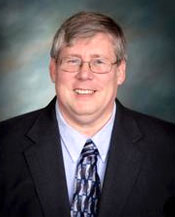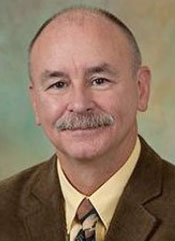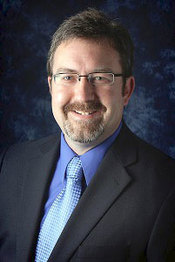Project ECHO: Changing North Dakota Fast
The SMHS works with key partners to facilitate shared learning between rural primary care teams and regional specialist in the treatment of opioid use disorder.
By Stacy Kusler on

It was Dr. Curt Small's turn to talk. He and two family medicine residents from the Minot-Williston rural training track appeared crystal clear on the screen as they spoke via video conference from CHI St. Alexius in Williston, North Dakota. The trio was joining a bimonthly video conference called Project ECHO to share their experience about a patient case involving opioid use disorder, and to contribute to finding better ways to treat this patient and others like him in rural North Dakota communities.
Project ECHO, or Extension for Community Healthcare Outcomes, is a "hub and spoke" model used internationally to equip community providers with knowledge, information, and resources from both specialist providers and their own peers using easily accessible video conferencing technology. Although developed in 2003 by the University of New Mexico School of Medicine as a tool to combat hepatitis C, Project ECHO has expanded around the world, helping clinicians—and rural care teams in particular—manage more than 65 complex health conditions better.
North Dakota launched its version of Project ECHO, which is administered by the North Dakota Department of Health & Human Services (NDHHS), in the fall of 2017 by way of a State Targeted Response grant from the federal Department of Health and Human Services. The project is a collaboration of the University of North Dakota (UND) School of Medicine & Health Sciences (SMHS) Center for Rural Health and Departments of Family & Community Medicine and Psychiatry and Behavioral Science, Blue Cross Blue Shield of North Dakota (BCBSND), and the NDHHS. Project ECHO specifically addresses the opioid epidemic in North Dakota by connecting specialists at academic or specialty health center "hub sites" with community-based primary care teams at "spoke sites" using video technology.
Lisa Faust, MD, senior medical director for Behavioral Health at BCBSND, is a key Project ECHO partner. She says North Dakota's rural geography creates unique challenges for access to care in the state.
Our providers are in great need of training, tools, and support for patients who present in their offices, emergency departments, and hospitals with opioid use disorders.
"Our providers are in great need of training, tools, and support for patients who present in their offices, emergency departments, and hospitals with opioid use disorders," she said. "Project ECHO allows providers access to addiction specialists for real-time practice supports without time away from clinical practice."
The Center for Rural Health facilitates teleECHO video sessions twice monthly. During each session, specialist clinicians from BrightView Health in Cincinnati, Ohio, a comprehensive outpatient addiction treatment facility, deliver a brief didactic presentation on a relevant opioid-related topic. Additional North Dakota health professionals, who are subject matter experts, also participate on the hub team. The remainder of the session is devoted to case presentations from rural North Dakota clinicians, such as Dr. Small. De-identified case-based learning, feedback, input, and guided practice tips are shared among specialist providers, subject matter experts, and clinical peers on the call.
During his case presentation, Dr. Small and his residents shared an encounter with a patient complaining of chronic pain and trouble sleeping. The resident physician checked the prescription drug monitoring program during that particular visit in order to review any history of opioid prescriptions for the patient. By participating in the teleECHO clinic, Dr. Small and his residents, as well as everyone on the call, could learn from peers at the spoke sites and query expert clinicians at the hub sites for advice and guidance on how to improve patient care in similar situations.

Subject matter experts, including Faust and Andrew McLean, MD, clinical professor and chair of the Department of Psychiatry and Behavioral Science at the UND SMHS, moderated the discussion between Small, the specialist from BrightView, and the spoke sites in North Dakota. This group discussed use of a particular tool, the screening brief intervention and referral to treatment (SBIRT), to help clinicians evaluate a patient with potential substance abuse issues.

Conference call contributors also offered examples of statements they have used during patient visits to encourage discussion of certain concerning behaviors and to engage patients better. David Schmitz, MD, professor and chair of the Department of Family and Community Medicine at the SMHS, says Project ECHO is like the "teach a person to fish" analogy.
"Healthcare providers are learning about new screening tools they can apply immediately to their local practice," Dr. Schmitz said. "It will be an ongoing goal of Project ECHO to empower and connect our local healthcare teams to approach treatment in a well-informed manner. The project is designed to 'raise all boats' for the betterment of health in our rural and underserved communities."
It will be an ongoing goal of Project ECHO to empower and connect our local healthcare teams to approach treatment in a well-informed manner.
McLean and Schmitz are co-medical directors for Project ECHO. They agree that embracing technology to offer immediate support to front-line clinicians also reduces feelings of isolation among rural providers.
"A major benefit of the teleECHO clinics is access to a multidisciplinary group of experts and peers in one virtual spot at one time," Dr. McLean added. "While practitioners have had access to online medical information for years, the use of teleECHO clinics provides relevant best practice education, discussion, and linkages in an efficient manner."
After presenting his case during the teleECHO clinic, Dr. Small said he is grateful to have access to this type of learning environment, and that his resident physicians will carry the experience forward into their own future practices as well. "This has been a really good way to bring expertise to the physicians working far away from the addiction experts. We have not had any contact with these specialists before Project ECHO," he said.
Dr. Small says he gained a tool from Project ECHO that he will be implementing in his clinic to better serve his patients.
There are many parts to this problem. But we realize that the problem is not going away and this program is designed to show us ways we can start addressing it more effectively in our community.
"After discussing my case study, we learned about the value of doing the SBIRT style of evaluation and referral, and that there are opioid dependence tools to use to evaluate the severity of the problem," he said. "There are many parts to this problem. But we realize that the problem is not going away and this program is designed to show us ways we can start addressing it more effectively in our community."
This article originally appeared in the Spring 2018 issue of North Dakota Medicine.


 is the connection between rural healthcare facilities in North Dakota and qualified health professional job seekers. As the workforce specialist, she assists rural facilities to attract medical providers and other health professionals to their communities by sharing job opportunities. Through her position, Stacy is working to reduce the healthcare workforce shortages throughout the state.
is the connection between rural healthcare facilities in North Dakota and qualified health professional job seekers. As the workforce specialist, she assists rural facilities to attract medical providers and other health professionals to their communities by sharing job opportunities. Through her position, Stacy is working to reduce the healthcare workforce shortages throughout the state.



